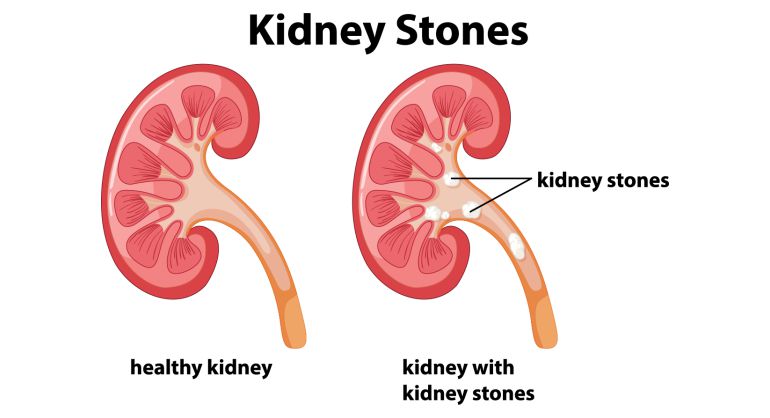Kidney stones can be easily cured by Homoeopathy without surgery
What Are Kidney Stones?
As the kidneys filter waste from the blood, they create urine. Sometimes salts and other minerals in urine, stick together to form small kidney stones. Kidney stones are common urinary tract disorders. The size of kidney stone can vary from the size of a sugar crystal to a ping pong ball, but they are noticed when they cause a blockage. They may cause intense pain if they break loose and push into the ureters, the narrow ducts leading to the bladder. One in every 20 people develops kidney stones at some point in their life.
Kidney stones always cause symptoms. When they small, they may pass on their own without pain. However, large stones may block urine flow, which can cause a number of painful symptoms that can be severe.
Types of renal calculi :
1.Uric acid stones
2.Calcium stones
3.Struvite stones (due to urinary tract infection)
4.Staghorn stones (when struvite stones get enlarged, they called as staghorn stones)
5.Cystine stones (Due to increase in cystine in urine).
Causes:
Kidney stones form when there is a decrease in urine volume and/or an excess of stone-forming substances in the urine.
Dehydration is an also a major cause for the formation of kidney stone.
Symptoms:
Pain Kidney stones can be quite painful. it depends on the location of the stone. Many people describe the feeling of kidney stones as a sharp pain on one side of their back or lower abdomen. You may experience constant pain, sometimes lasting for a few minutes and then disappearing, and in some cases, the pain may last for a longer time while fluctuating in intensity. A change in the level of intensity may occur as the stone moves to a different position in your urinary tract.
1.Burning pain while urinating
2.Appearance of sediments in urine
3.An increased urge to urinate more often than usual
4.Blood may present in the urine in some cases
5.Nausea & Vomiting
6.Chills & fever
7.After the appearance of above symptoms, you should consult a doctor.
8.The role of Homoeopathy in Kidney Stones:
In allopathy, Surgery is the only option to remove the kidney stones. While surgery can be expensive; it also involves a lot of emotional and physical suffering. Also, Surgery cannot give a guarantee that the stones will not form again after surgery.
By homeopathic medicines, one can easily remove the kidney stones naturally. With homeopathy, you can avoid surgery and it also cures the tendency of the body to form stones. Kidney stone Homeopathic medicines can break down and dissolve kidney stones or help them pass out as it is without surgical intervention.
There are many homoeopathic medicines that have the potential to remove the kidney stones or renal calculi, some of them are more frequently used. Out of them, some well-known Homeopathic medicines are Berberis Vulgaris, Lycopodium Clavatum, Hydrangea Arborescens, Cantharis Vesicatoria, Benzoic Acid and Sarsaparilla Officinalis, kidflame tablet
Bhargava Renoflam Syrup: For all type of Kidney Stones . It is an excellent formula of well-known homoeopathic medicines for kidney stones, and can easily remove all types of kidney stones and stops their further formation.
The ingredients and action of each ingredient are listed below
Berberis vulgaris Q: Indicated in renal calculi. Pain radiates from left kidney along with the ureter and sets into bladder and urethra, with urging and strangury.
Cantharis 3X: Irritation in the urinary bladder, chronic nephritis, and chronic cystitis with violent burning, cutting pains in the neck of the bladder, frequent urination. There are intolerable tenesmus and strangury in the urinary system.
Calcarea renalis 3X: For renal colic due to uric acid or phosphate stones, also prevents recurrence of kidney stones by stopping its further formation.
Acid oxalic 3X: For oxaluria copious urine containing calcium oxalate.
Ocimum canum Q: For uric acid renal calculus & right sided renal colic.
Pareira brava Q: It acts as a stimulant and tonic, relieving irritation of the urinary tract, indicated by constant urging, great straining & pain down the thighs during urination.
Sarsaparilla Q: Indicated in cystitis and right sided renal colic from kidney stones.
Senecio aureus Q: Indicated in renal colic; irritable bladder; nephritis with constant urging to urinate and tenesmus.
Dosage:
Adults: One Tablespoonful 3 to 4 times a day.
Children: One Teaspoonful 3 to 4 times a day.
Read Comments
Please Add and approve your comment by admin

.jpg)
.jpg)

Add Your Comments
Your Rating